Conversational AI refers to the technology that powers chatbots and virtual agents, allowing them to communicate with people in a conversational manner. These AI-based applications utilize natural language processing and machine learning to retrieve data from consumer interactions and improve the accuracy of responses.
According to Capterra’s Tech Trends Report, over 50% of online shopper[1] are interested in using conversational AI tools for ecommerce to buy items.
But what are the main reasons why online businesses are hot for conversational AI platforms? And what are the best platforms in this category?
All good questions, and we’ll help you navigate them—one by one.
| Conversational AI platform | G2 rating | Free plan | Best for |
|---|---|---|---|
| Tidio | 4.7/5 ⭐️ | ✅ | Chatbot automation |
| Zendesk | 4.3/5 ⭐️ | Free trial available | AI-powered bots |
| HubSpot | 4.4/5 ⭐️ | ✅ | Free CRM functionality |
| Intercom | 4.5/5 ⭐️ | Free trial available | No code visual builder |
| Zoho Desk | 4.4/5 ⭐️ | ✅ | Ticket management system |
| Freshdesk | 4.4/5 ⭐️ | ✅ | Omnichannel routing |
| Salesforce | 4.3/5 ⭐️ | Free trial available | Help desk automation |
| Help Scout | 4.4/5 ⭐️ | ✅ | Shared mailbox |
| HappyFox | 4.5/5 ⭐️ | Free trial available | Self-service knowledge base |
| Kustomer | 4.4/5 ⭐️ | ❌ | Multi-channel support |
| ServiceNow | 4.4/5 ⭐️ | ❌ | ITSM support |
| Front | 4.7/5 ⭐️ | Free trial available | Live chat capabilities |
First things first—
How do conversational AI platforms work?
Conversational AI uses deep learning to analyze and understand conversational flows and create relevant responses. But there’s more to this if you look closer. Let’s unpack the conversational AI process here:
- Input interface—at this point, a user provides text or voice input to the conversational AI software
- Natural language processing (NLP)—translates the unstructured data into information that AI technology can understand and formulate a relevant response to and extracts user intent
- Natural language understanding (NLU)—this brings out the intents, contexts, and grammar structure to understand the meaning of the input. It provides a dialogue management unit for coming up with accurate responses
- Natural language generation (NLG)—involves a process that forms relevant responses from the unstructured data readable to humans
Read more: Find out the key differences between chatbots and conversational AI. Also, check out some proven strategies for effective live AI customer support.
With that out of the way, it’s time to look at the best conversational AI platforms for your website.
Top 12 conversational AI tools
We have compiled the best conversational AI platforms with their key features, customer reviews, pricing plans, and trial availability for your consideration.
Have a look to compare and choose the one that fits your organization’s needs:
1. Tidio

Ratings: 4.7/5 ⭐️ (1,505+ reviews)
Tidio offers a conversational AI chatbot solution known as Lyro AI. The platform uses machine learning and NLP chatbots to engage with consumers and generate sales for your site. You can also access several templates from its visual chatbot builder interface and create your custom bots.
Lyro understands your knowledge base content and uses it to engage with your audience on live chat. The software allows support managers to monitor customer interactions in real time and intervene whenever necessary.
Still not convinced? Try our conversational AI software for free and decide if we deserve the top slot in this list.
Main features:
- Virtual shopping assistant templates for ecommerce
- Chat flows editor
- Customer self-service portal
- Shared inbox for multi-channel functionality
- Canned responses
- Customer segmentation of service requests
Pricing:
- 7-day free trial available
- Free version available
- Starter ($24.17/mo)
- Growth (starts at $49.17/mo)
- Plus (starts at $749/mo)
- Premium (starts at $2999/mo)
Read more: Learn about how to use Tidio’s conversational AI chatbot to simplify customer interactions for your service teams. Also, check out how Tidio’s support team automated the majority of queries using Lyro.
Enhance your customer service efforts with Lyro, conversational AI
2. Zendesk

Ratings: 4.3/5⭐️ (6,350+ reviews)
Zendesk is one of the best conversational AI platforms for providing instant help on your website, mobile apps, and business channels. Its AI-powered chatbots can analyze a consumer’s intent on your site and provide unique suggestions. Support agents can use them to answer routine questions and choose when to bring a human agent to resolve an issue.
The AI conversational bots can be integrated into your website or mobile application, or on popular social messaging apps like Slack, Facebook Messenger, and WhatsApp. The customer support tool also provides proactive SMS to drive customer engagement and reduce escalations.
Pros:
- Outbound notification feature
- Social media integration through Facebook chatbot
- Live location maps for self-service
Cons:
- Help desk automation can be difficult to set up
- The GUI needs improvement
Pricing:
- Free trial
- Basic plan ($19/mo/agent)
- Suite Team ($55/mo/agent)
- Suite Growth ($89/mo/agent)
- Suite Professional ($115/mo/agent)
- Suite Enterprise → Contact sales
- Suite Enterprise Plus → contact sales
Read more: Check out the reviews about Zendesk alternatives and choose the best customer service software for your ecommerce site.
3. HubSpot
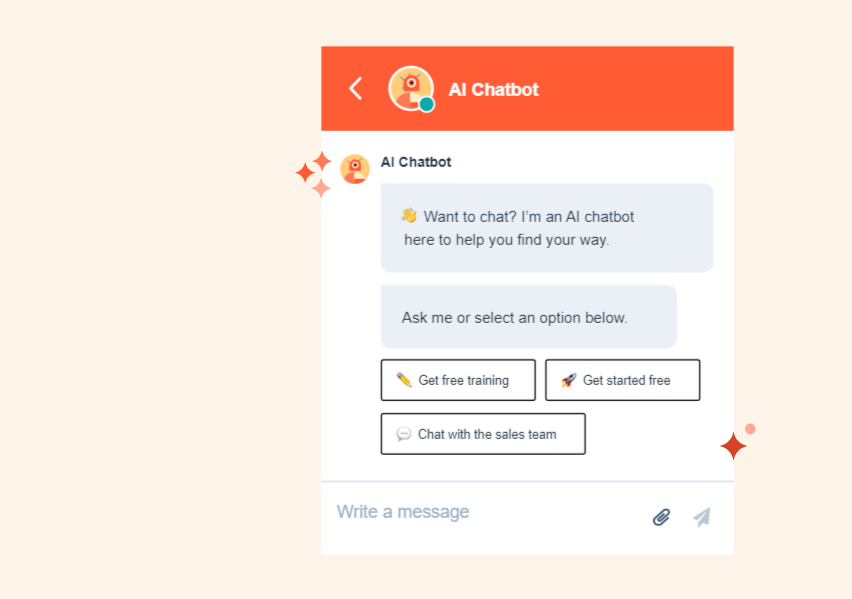
Ratings: 4.4/5 ⭐️ (2,245+ reviews)
HubSpot offers a free conversational AI solution for scaling businesses. The tool is powered by OpenAI’s platform and ChatGPT to automatically generate content and optimize your site’s SEO. Its AI chatbot enables you to send share prompts and pre-defined bot templates to request information, create content, and perform actions.
Pros:
- Free CRM software
- 1,000+ third-party integrations
- Built-in service level agreements (SLAs)
Cons:
- Lacks a license management feature for enterprises
- Search functionality requires improvement
Pricing:
- Free version available
- Starter ($15/mo/seat)
- Professional ($100/mo/seat)
- Enterprise ($150/mo/seat)
Read more: Discover the best HubSpot alternatives for your marketing and customer support needs.
4. Intercom
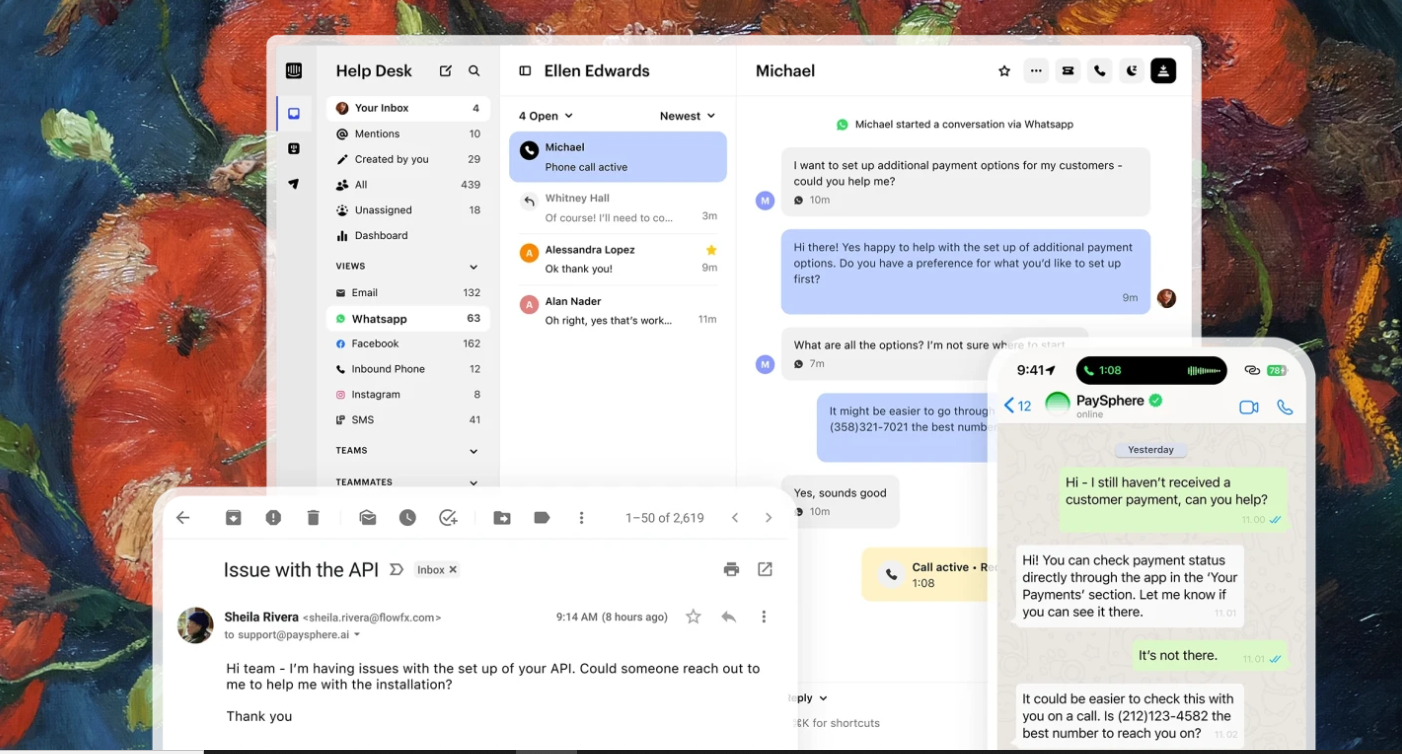
Ratings: 4.5/5 ⭐️ (2,975+ reviews)
Intercom’s Fin AI is a conversational AI platform that generates responses to customer queries based on your knowledge base content. It can fully grasp complex questions and ask clarifying questions to deliver CSAT-enhancing service. Moreover, it consolidates answers from multiple sources and shares them with the right audience through content targeting.
Pros:
- Proactive live chat capability
- Multilingual support in 45 languages
- Instagram chatbot
Cons:
- Customer segmentation can be difficult
- Lacks the ability to merge conversations
Pricing:
- Free 14-day trial available
- Fin AI Agent ($0.99 per Fin resolution)
- Essential ($39/mo/seat)
- Advanced ($99/mo/seat)
- Expert ($139/mo/seat)
Read more: Compare the best Intercom alternatives and decide on the most appropriate option for your support team.
5. Zoho Desk

Ratings: 4.4/5 ⭐️ (5,540+ reviews)
Zoho Desk has Zia, an AI-powered virtual assistant for your business to stay on top of its customer service operations. Its conversational AI software enables it to process questions from end-users and suggest relevant solutions from your knowledge base content. The AI bot updates support managers about topics where answers were unsatisfactory for them to intervene.
Pros:
- Automatic tagging of tickets
- Vital analytics through a unified dashboard
- Sentiment analysis for the support team
Cons:
- Occasional slow performance
- API functionality is limited
- Free version available
- Express ($9/mo/user)
- Standard ($20/mo/user)
- Professional ($35/mo/user)
- Enterprise ($50/mo/user)
Read more: Learn more about the best Zoho Desk alternatives you can consider for your customer service needs.
6. Freshdesk

Ratings: 4.4/5 ⭐️ (3,120+ reviews)
Freshdesk is a popular AI customer service tool that enables companies to consolidate multiple communication channels in a single location. The tool offers a conversational AI solution known as Freddy Copilot. The digital assistant acts as a real-time conversation coach, facilitating quality and fast responses on IVR, improving your customer experience.
Pros:
- AI-powered ticket escalation and routing
- Omnichannel customer service inbox
- Smart responses for efficient query resolution
Cons:
- Adding screenshots can be problematic
Occasional system glitches
Pricing:
- Free version available
- Growth ($18/mo/agent)
- Pro ($59/mo/agent)
- Pro + AI Copilot bundle ($94/mo/agent)
- Enterprise ($95/mo/agent)
Read more: Study the list of reviews and select the best Freshdesk alternatives for your organization.
7. Salesforce
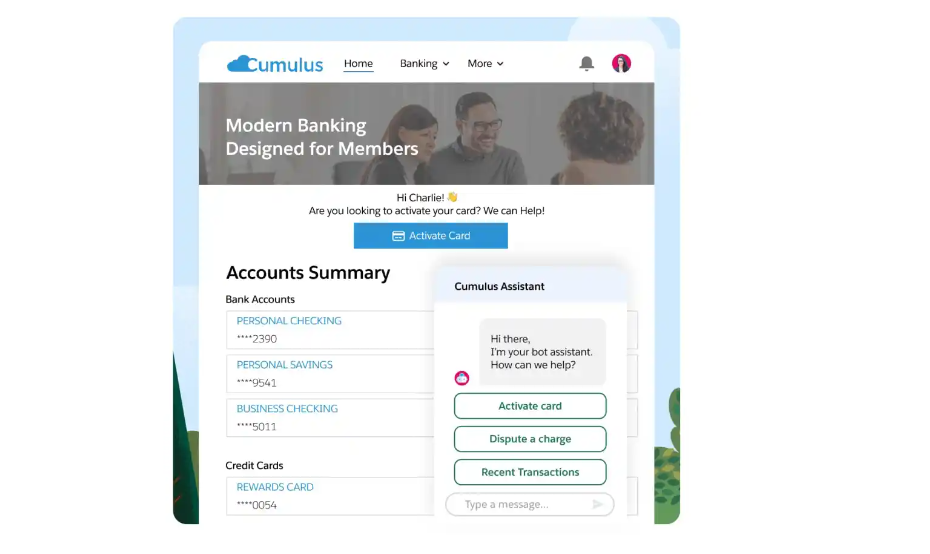
Ratings: 4.3/5 ⭐️ (3,795+ reviews)
Salesforce is a customer service automation tool that is suitable for resolving user requests at scale. The platform has an AI solution called Einstein Copilot which utilizes generative AI to help agents deliver personalized service. It also speeds up query resolution and creates seamless interactions between communication channels.
Pros:
- AI-powered conversation summaries
- Low code chatbot builder
- Cloud management service for sites
Cons:
- The steep learning curve for new users
- Requires a provision for merging duplicate cases
Pricing:
- 30-day free trial available
- Starter suite ($25/mo/user)
- Pro Suite ($100/mo/user)
- Enterprise ($165/mo/user)
- Unlimited ($330/mo/user)
- Agentforce 1 service ($500/mo/user)
Read more: Check out the most practical enterprise chatbot use cases, benefits, and tips. Also, while you’re at it, learn how to prepare for automation using our AI customer service checklist.
8. Help Scout
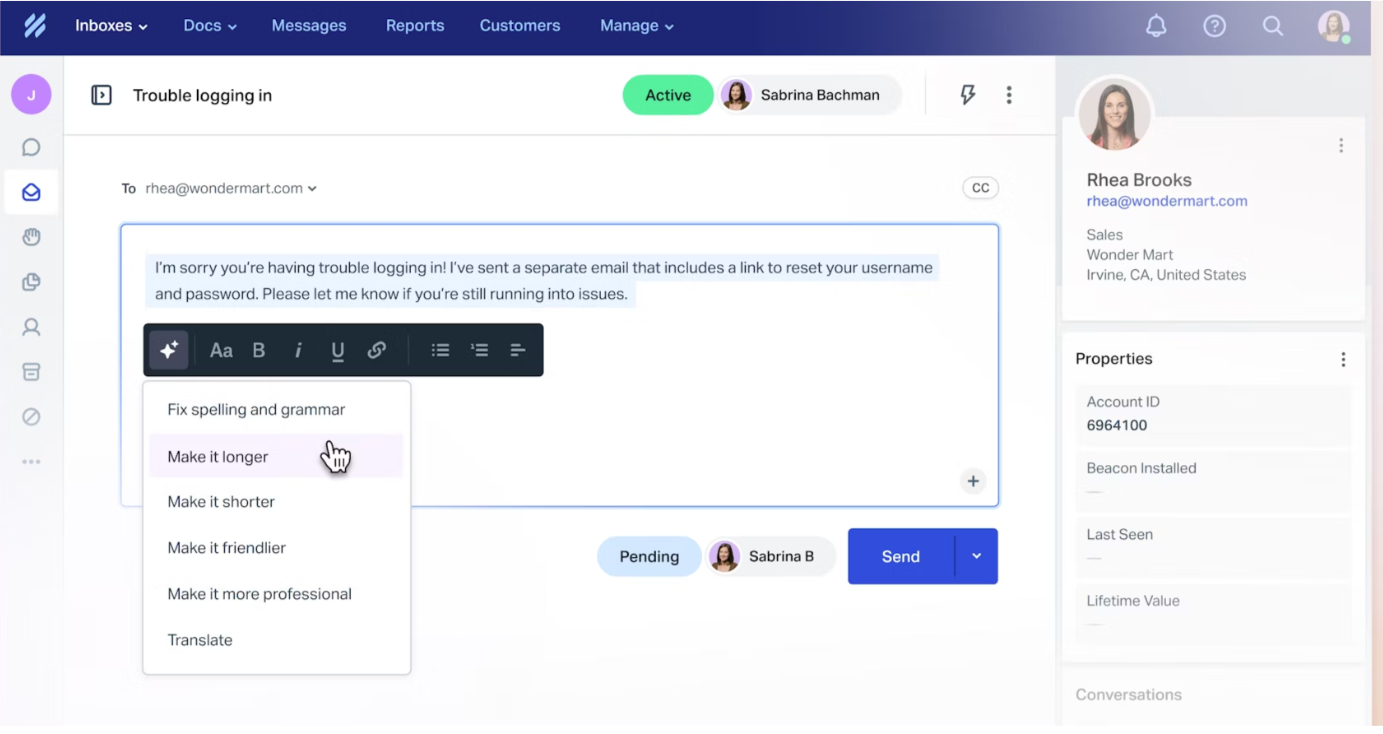
Ratings: 4.4/5 ⭐️ (400+ reviews)
Help Scout is a customer support software that offers integrated email, knowledge base, and live chat capabilities. You can utilize its conversational AI service to condense long email threads in bullet point summaries. Artificial intelligence can expand fragmented thoughts, fix robotic content, and adjust your tone of voice depending on the context of a conversation.
Pros:
- Collaborative inbox
- User-friendly interface
- Automated help desk workflows
Cons:
- Limited reporting features
- Spam filters need enhancement
Pricing:
- Free version available
- Standard ($25/mo/user)
- Plus ($75/mo/user)
- Pro → Contact sales
Read more: If you are considering alternative options, check out other viable Help Scout alternatives.
9. HappyFox
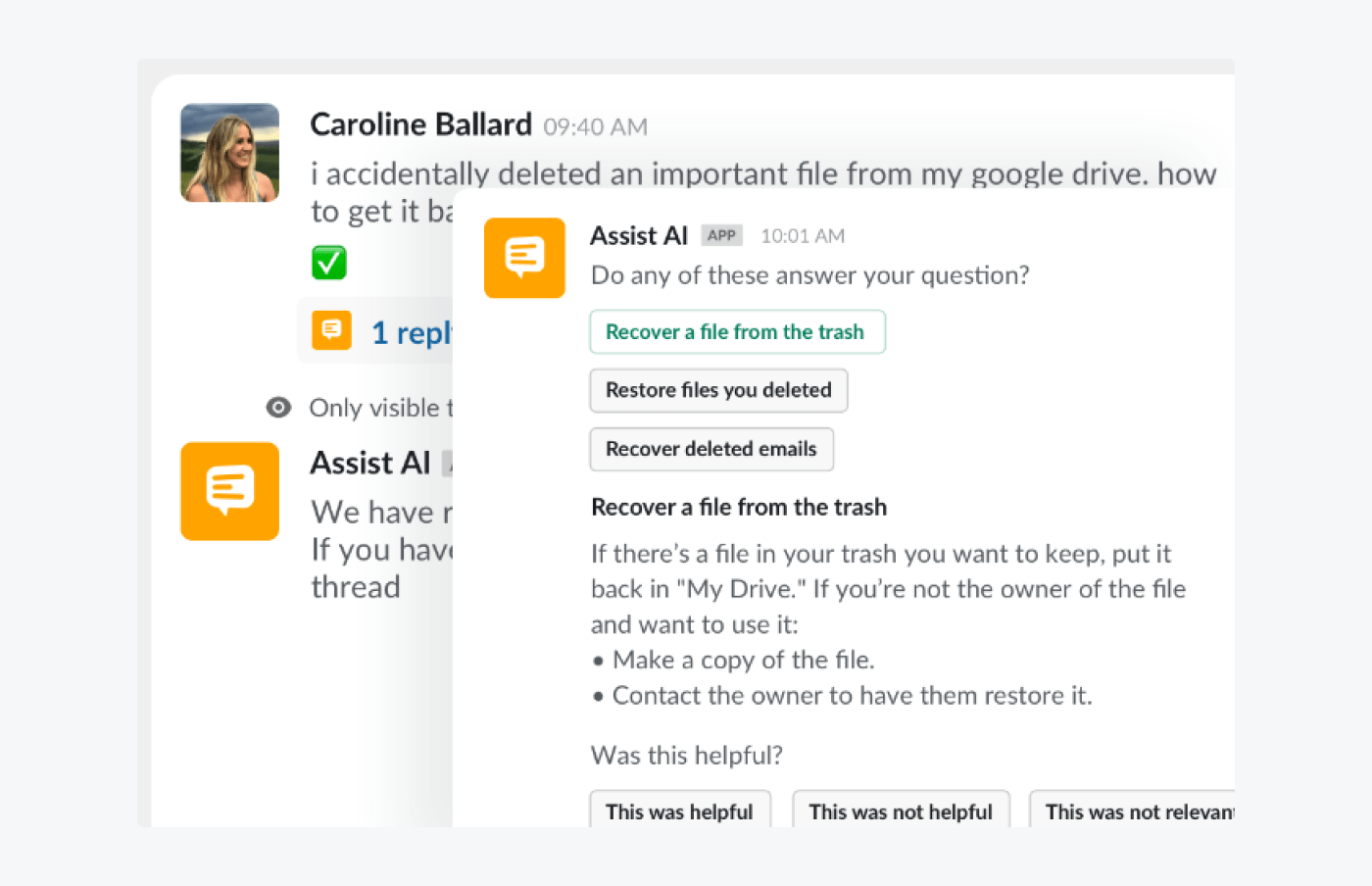
Ratings: 4.5/5 ⭐️ (125+ reviews)
HappyFox is a help desk management software with impressive multi-channel capabilities. Its conversational AI platform provides support to employees by resolving IT and HR support requests. Assist AI delivers personalized responses to staff requests while giving you insights on how to improve employee experience.
Pros:
- IT help desk and service desk
- Microsoft Teams integration
- Intuitive user interface
Cons:
- Limited third-party integrations
- Requires improvements to the ticket notification feature
Pricing:
- Free trial available
- Basic ($29/mo/agent)
- Team ($69/mo/agent)
- Pro ($119/mo/agent)
- Enterprise Pro → Contact sales
10. Kustomer
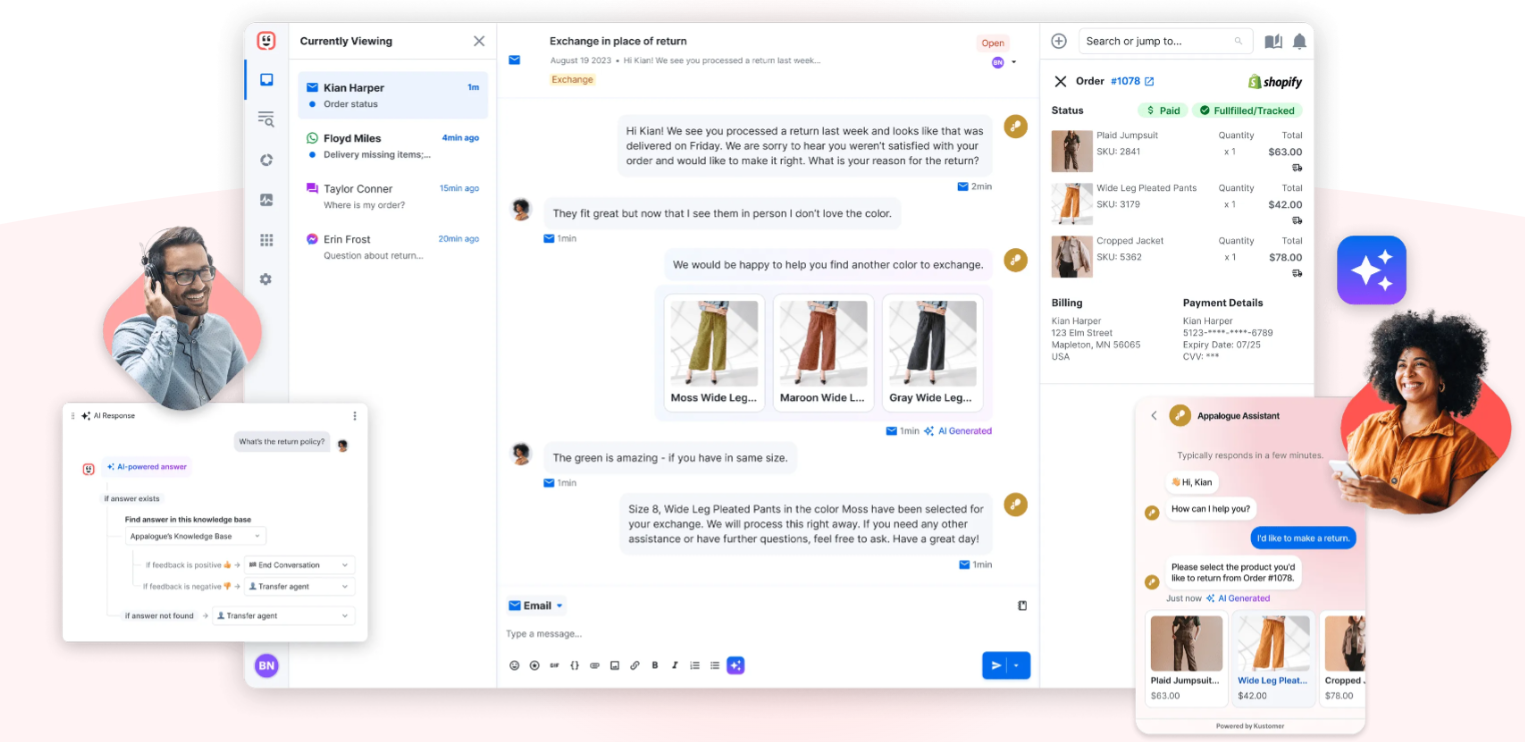
Ratings: 4.4/5 ⭐️ (415+ reviews)
Kustomer is a client support platform powered by big data and AI. The software’s AI Agent Copilot aims to empower agents to resolve support issues through personalized interactions. By using this feature, support reps can increase their operational efficiency by up to 65%.
Pros:
- AI conversational summaries for live chat
- 2-way translations in 50+ languages
- Multiple shared mailboxes
Cons:
- Lacks a visual edit interface in the customer self-service portal
- Insufficient technical documentation
Pricing:
- AI Agents for Customers ($0.60 per engaged conversation)
- AI Agents for Reps ($40/mo/user)
- Enterprise ($89/mo/user)
- Ultimate ($139/mo/user)
Read more: Learn how AI copilots for customer service work and how they can lighten the load for your support team. Also, check out all you need to know about AI agent assist and how it can help your business.
11. ServiceNow

Ratings: 4.4/5 ⭐️ (155+ reviews)
ServiceNow is a cloud-based customer management software that uses artificial intelligence for businesses to drive real-time sales. Its AI conversational chatbots are useful in personalizing consumer interactions. Moreover, it allows your agents to deploy pre-built conversations or create their own.
Pros:
- Customizable chatbot conversational interfaces
- Performance analytics and predictive intelligence
- Auto-resolution of issues
Cons:
- Slow loading times and occasional errors
- The user interface needs improvement
Pricing:
- Custom quote→ Talk to a ServiceNow representative
12. Front
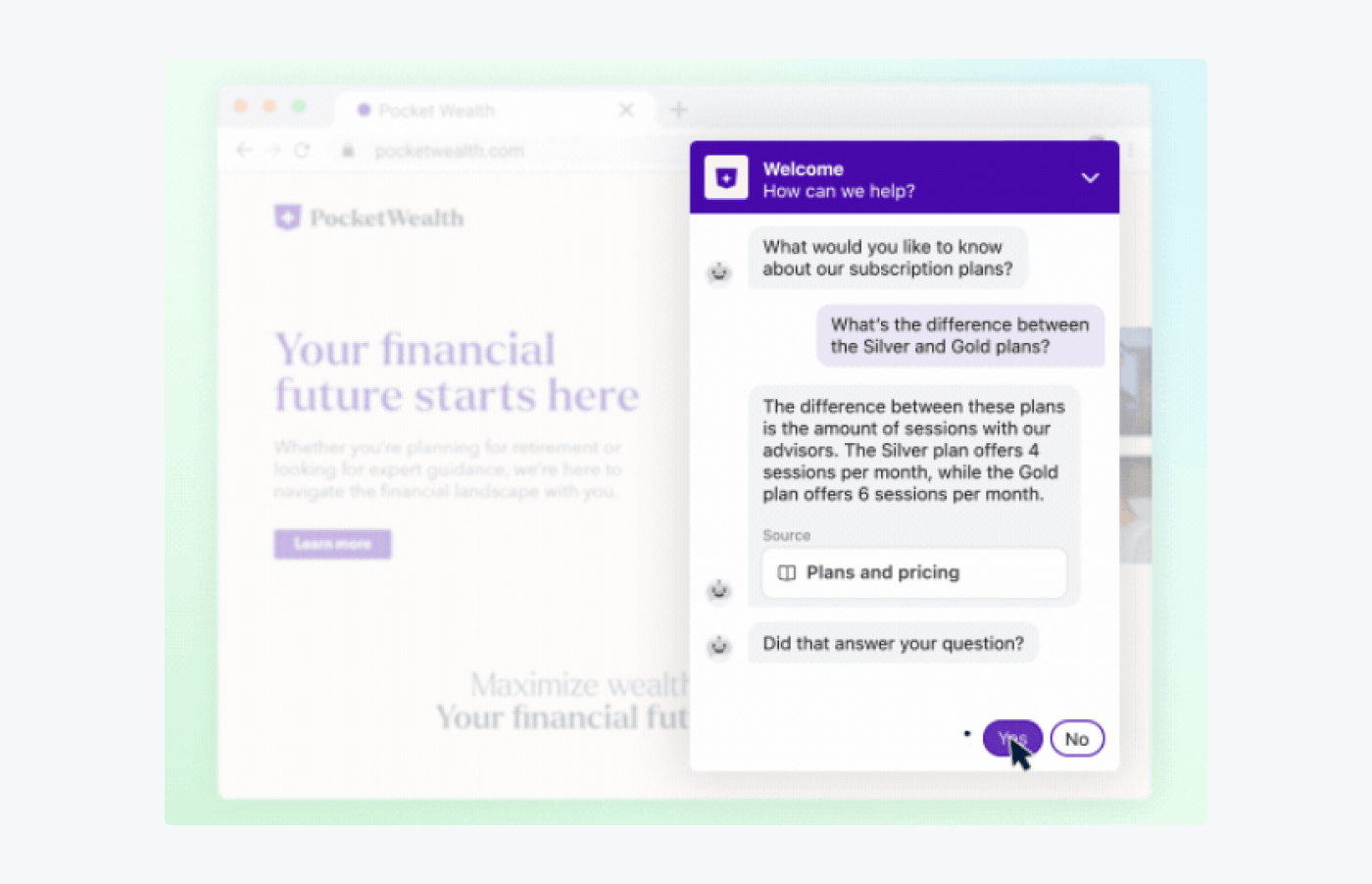
Ratings: 4.7/5 ⭐️ (2,090+ reviews)
Front is a help desk tool that is known for its conversational AI chatbot platforms. The AI-powered chatbots respond to support requests in real time and share unique contexts about conversations with agents. The bots deflect and respond to common inquiries, thus freeing up your service team to focus on more complex tasks.
Pros:
- Auto-tagging feature
- Auto-draft replies to customer emails
- Agent collaboration on email threads
Cons:
- Confusing user interface
- Compatibility issues integrating to Microsoft 365
Pricing:
- 14-day free trial
- Starter ($35/mo/seat)
- Professional ($85/mo/seat)
- Enterprise → Contact sales
Read more: Compare the best Front alternatives according to their features, cost, and add-ons.
With the best tools examined, let’s discuss the value of conversational AI tools for your website.
Why should you use conversational AI software?
There are several use cases for implementing AI ecosystem in customer service centers. Conversational AI platforms can handle client engagement, process real-time sales orders, and perform market automation.
Here are some of the benefits of using conversational AI platforms:
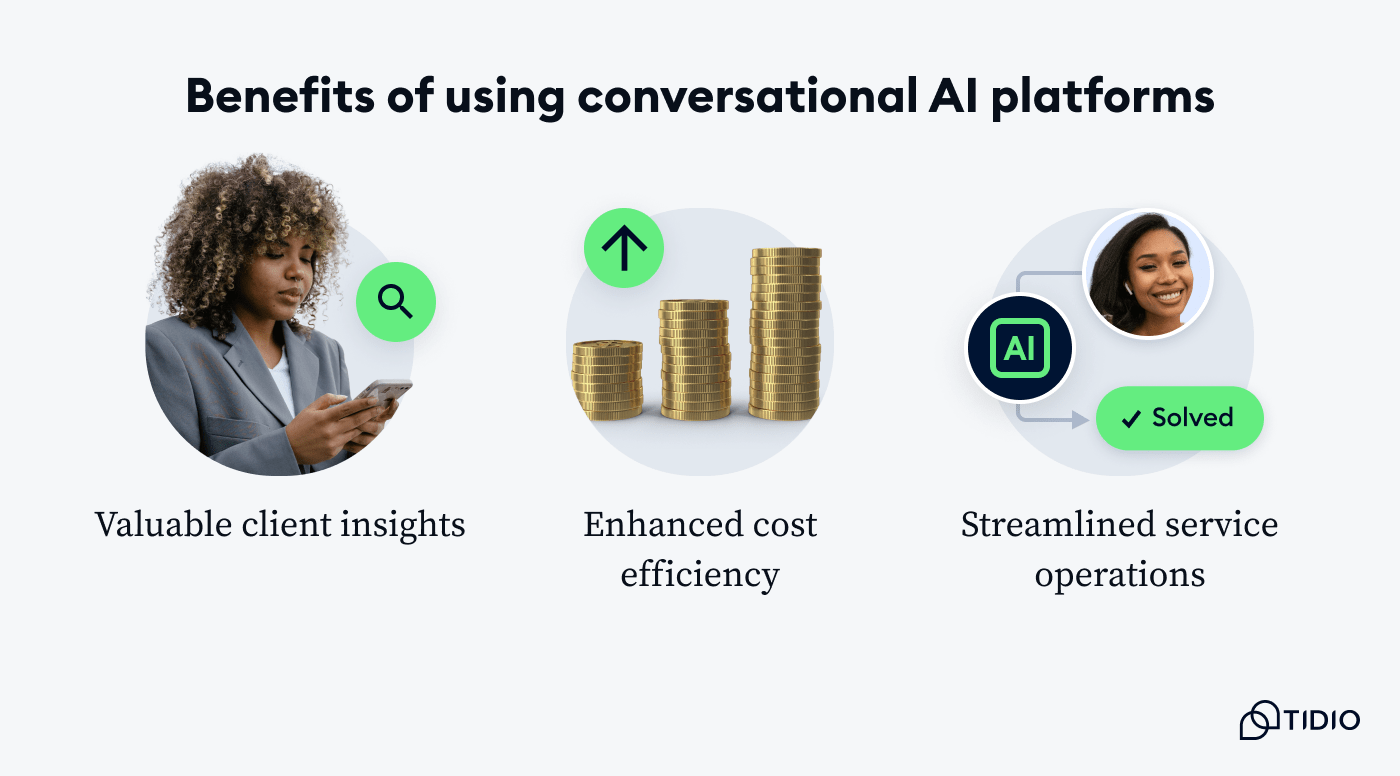
- Valuable client insights: generative AI software is integrated into chatbots to solicit feedback from clients. According to a Microsoft customer service survey, 82%[2] of young consumers look favorably on brands that proactively ask for customer feedback.
- Enhanced cost efficiency: conversational AI operates independently with minimal supervision and thus has low maintenance costs. A research indicates that AI customer service interactions are 30%[3] cheaper than traditional agent interactions.
- Streamlined service operations: the use of conversational AI chatbot solutions for customer support has resulted in efficient service delivery. MIT’s Technology Review[4] shows that the use of conversational AI has resulted in an 80% increase in customer satisfaction and overall service team performance.
Drawbacks of conversational AI
While conversational AI platforms bring clear gains in speed and scalability, they’re not without their trade-offs. Being aware of the limitations can help you better manage expectations and plan for a hybrid setup with both AI and human agents.
- Initial setup effort: although many tools are no-code, you’ll still need time to train the bot, import content, and test the experience.
- Limited responses for edge cases: conversational AI tools may struggle with highly specific or emotional queries without human backup.
- Ongoing maintenance: to remain effective, conversational apps require regular updates, content refreshing, and performance reviews.
How to implement conversational AI in your business
Implementing conversational AI is more accessible than ever, especially with platforms that offer no-code interfaces and pre-built templates. Still, to get real value from the tool, you need a clear rollout plan that aligns with your existing customer support strategy. Below are the key steps to help you get started:
- Identify your goals
Define what you want to achieve with AI. Is it to automate FAQs, improve first response time, or support lead generation? - Choose the right platform
Pick a system that aligns with your needs and integrates easily with your current tools. If you’re looking for an intuitive setup, Tidio’s Lyro is a good start, especially for ecommerce and growing support teams. - Import your knowledge base
Feed the AI your existing FAQs, product pages, or documentation so it can start generating accurate responses out of the box. - Customize the experience
Adapt the chatbot’s tone and branding to match your company’s voice. This includes personal greetings and fallback messages. - Test and monitor performance
Run internal tests before going live. After deployment, track metrics like resolution rate and CSAT to optimize performance.
Get the right conversational AI platform for your needs
We’ve already witnessed the success of enterprise-grade AI systems and voice assistants like Alexa, IBM Watson Assistant, and Amazon Lex.
Now it’s time for a revolution in the field of customer service.
It’s no surprise—AI solutions can improve user experience, manage client interactions, and scale contact center operations. Consequently, advanced conversational AI platforms have led to a paradigm shift in customer service dynamics, transforming traditional models with cutting-edge and personalized solutions.
As a quick recap, here are the top conversation AI platforms:
- Tidio
- Zendesk
- HubSpot
- Intercom
- Zoho Desk
- Freshdesk
- Salesforce
- Help Scout
- HappyFox
- Kustomer
- ServiceNow
- Front
According to the reviews, Tidio is the top contender for the best conversational AI platform. Our own support team is using it with success, achieving 58% automation for answering queries and 75$ decrease in first response time.
Moreover, in terms of scalability, the software can support a range of businesses from small teams to mid- and bigger-level organizations.
But don’t take our word for it.
Sign up for free and give Lyro a try today!
FAQs
Tidio is a customer service software platform that combines live chat, ticketing, and automation. It supports businesses in managing customer conversations across channels like email, Messenger, WhatsApp, and Instagram.
Yes. Tidio offers Lyro, a conversational AI assistant that uses NLP to provide instant, human-like responses to customer queries.
Tidio is primarily used to automate customer support and provide live chat assistance. Businesses use it to reduce resolution time, automate common questions, and improve customer satisfaction.
Look at KPIs like resolution rate, deflection rate, CSAT scores, average handling time, and how many tickets are resolved without agent input.
Costs vary based on provider, features, and scale. Tidio offers a free plan, with paid options starting from $24.17/month. Premium tiers provide more automation and integrations. For ROI, Tidio’s Lyro AI resolves 67% of customer queries, significantly reducing the need for human agents.
Most platforms offer native integrations with CRMs, ticketing systems, and messaging apps. Tidio integrates with Shopify, WordPress, Messenger, Instagram, and email out of the box, making it easy to consolidate all support channels into one inbox.
Traditional chatbots follow rule-based flows and decision trees. They’re fast but rigid. Conversational AI uses NLP and machine learning to understand context and intent, making interactions feel more natural and adaptive.
Use Tidio’s conversational AI chatbot to streamline support processes

